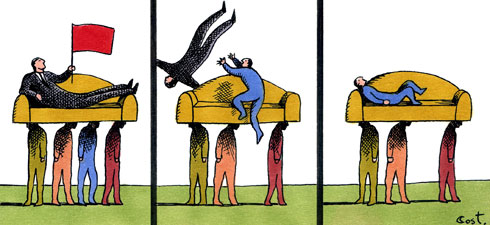The tempo of recycling among governments and ministers has gone over the acceptable limit. Consider just the key ministries of industry, transport, agriculture and education. Since the formation of the first Topolanek government in September 2006 we are now at the sixth Minister of Transport, the fifth Minister of Agriculture, and are waiting for the fifth Minister of Education; the Ministry of Industry and Trade is now under its fourth head, and there have been three prime ministers. All this in just five and a half years. With each new minister the rudder always shifts a little in a different direction, priorities get jumbled, and a lot of good work gets left in a drawer.
Among the top management of the ministries it’s not about professionalism and loyalty to the state, but about allegiance to the new boss. That new broom must, moreover, also satisfy the hunger of current political allies for state money. And no sooner has a ministerial novice cleared the room of the staff put in place by his predecessor than he has to slowly get ready to depart himself.
A return of the communists?
In the last two weeks the fate of the whole government has hung in the balance, and now another reshuffle of personnel is looming up. The figurative pendulum of voter sentiment, moreover, has swung strongly to the left. It may not be just the individual ministers that may change, but the overall views of the cabinet on the economy, the debt crisis, the European Union, the euro, subsidies, export promotion strategy... If early elections were held today, the latest survey shows, the CSSD (Social Democrats), would win with 37 percent of the vote. The CSSD has not ruled out working with the Communist Party, which would get 20 percent of the vote. What the Social Democrats are preparing to do differently than the centre-right cabinets is set out by a journalist in the Ekonom weekly, Josef Pravec.
Hewrites: “The trade unions would push a clearly left-wing platform on the communists and Social Democrats in the coalition cabinet. Steps towards reform and the struggle with the crisis would look very different than they do today. First of all, the current policy of cuts would end, and the priority would shift towards supporting demand. The first step, however, would have to be tax increases. ČSSD chairman Bohuslav Sobotka, who would probably become prime minister, has repeatedly talked about the gradual increase in the tax rates of at least three to four percent.”
For myself, I add that it’s clear from the statement of the leaders of the Social Democrats that they will want to draw up a future government with the support of the Communists within two years. I took a look at their platform for the 2010 elections. Right at the start it says: “The basic platform of the KSČM (the Communists) is socialism (...) where social ownership plays a key role in the economy.” I don’t know about you, but I still prefer the Nečas government, despite the stink.
Comment
How long will Nečas hold on?
"Last chance for the Petr Nečas government," leads Mladá Fronta Dnes the day the centre-right cabinet put a motion of confidence before of Parliament – two years before the end of its term. Caused by a corruption scandal in the Public Affairs (VV) party, the tripartite coalition of the ODS, TOP 09 and VV broke up on April 24.
To ensure a majority in parliament the government will have to enlist the support of 11 former members of VV gathered around the former vice-president of the party and deputy prime minister Karolína Peake. “But for how long?,” asks the Prague daily, which expects that the government, divided, may have difficulty getting the necessary backing for measures such as the finalisation of the pension reform, the restitution of Church property confiscated by the Communists in 1948, or the direct election of the country’s president.
The demonstration against the austerity policy, which attracted a crowd of about 100,000 on April 21, shows that the Nečas government is also losing the support of citizens tired of the political instability caused by numerous scandals, notes MF DNES, the paper that exposed the scandals.
Was this article useful? If so we are delighted!
It is freely available because we believe that the right to free and independent information is essential for democracy. But this right is not guaranteed forever, and independence comes at a cost. We need your support in order to continue publishing independent, multilingual news for all Europeans.
Discover our subscription offers and their exclusive benefits and become a member of our community now!












